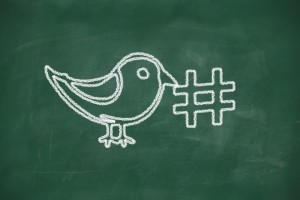
People increasingly use the Internet to find out and talk about their health issues. Through blogging and social media platforms such as Twitter, people are finding ways to express their views, share their experiences and communicate with others who have the same condition.
Research has been slow to capture this impact though, and in-depth studies of digital health use (such as hashtag discussions about health issues on Twitter) is rare.
Congratulations then to the authors of this novel review that examines tweets on the #DearMentalHealthProfessionals hashtag, to see what it tells us about mental health service users views, and also what it tells us about social media itself.

Twitter hashtags are used to mark keywords or phrases in tweets, and make it easy to search for all messages on a single topic.
Methods
- The authors simply searched Twitter on the #DearMentalHealthProfessionals hashtag and plucked out any tweets using the hashtag from two days (10-11 August 2013). I assume the date limit was to manage the volume of material.
- They removed retweets, and it seems just looked at tweets in isolation rather than for example tracking interactions or conversations. They also “rendered tweets anonymous.”
- They then used thematic analysis to analyse the data (looking for common themes apparent across the data set).
Results
The final data set comprised 515 original tweets. They found 4 overarching themes:
- The impact of diagnosis
- The balance of power between professionals and service users
- Therapeutic relationship and developing professional communication
- Support provision through medication, crisis planning, service provision and wider society
Other categories were recognised but excluded from further analysis:
- “Thanks”, expressions of gratitude to mental health services or professionals,
- “Self-referential”, which were endorsements of the hashtag or calls for others to participate, and
- “Linking out” which refers to links to other resources, primarily blogs by participants.
The authors say they didn’t access this material “to maintain confidentiality”, though it’s not clear to me how using blog material differs from using tweets if you’re adopting an approach of anonymising the data extracted.

Many of the studied tweets related to the impact of diagnosis on personal identity and as a facilitator for accessing care.
Conclusions
The authors themselves note that the actual themes that emerged are already quite well documented in the academic literature. They focus instead on the implications in terms of our understanding of the role of social media, stating:
[the themes] represent the potential of social media platforms to allow discussion, reflection and sharing of experience by participants within the space provided.
The authors comment that it’s unknown whether such online conversations encourage change in opinions (noting that in social media networks people tend to connect with people who share, rather than challenge, their views), and separately discuss the potential for such platforms to allow direct feedback between service users and health professionals (although noting it’s not currently clear how this can best be achieved and how to do so in a way that’s acceptable).
For me, the interesting question would be in the middle of those points; do discussions such as these prompt any changes in health professionals’ views?

The research was not able to study behaviour change on the part of the service users engaged in tweeting.
Limitations
I think reducing the accounts to static data rather than looking at interactions (indirect, through favourites and retweets, and direct responses or conversation trails) misses a trick, and robs the data of its potential richness. I accept however that this kind of analysis is more complex. Perhaps something like social network analysis would be useful?
The decision also to exclude ‘external’ material such as blogs I think misses out on the depth and breadth of content that a discussion such as this encompasses. I think this perhaps shows that currently we don’t know what the best tools are for exploring the impact of platforms such as Twitter. I think content analysis will be part of this, but it isn’t sufficient on it’s own.
Similarly, the decision to anonymise the data completely also means we don’t get a sense of who was contributing what to the discussion. Were both professionals and service users tweeting on the tag for example? Were there patterns of themes, or did users tweet across multiple themes (an interesting one would be if users who criticised services also tweeted “Thanks”.) The themes that emerged are ones that we are already aware of in the academic literature, so is the issue about who is expressing those themes rather than the themes themselves? The decision to make the data anonymous is described in terms of ethics, which is my next issue…
This is a personal view, but I’m somewhat uncomfortable with the ‘assumed ethics’ of using Twitter data without consulting the producers of that data in some way. The authors rightly point out that Twitter is a public platform, so there is an implicit consent given, and that its terms and conditions technically permit scraping data in this way. Other researchers have argued it’s wrong not to use this resource (though I find the “greater good” arguments a bit dubious myself.) The approach seems to be that as long as personal details, such as usernames, are removed, then it’s OK both to extract data for research purposes and to publish it. I’d point out though that you can search back to the original post and see who wrote the tweet so it isn’t quite that straightforward. This also doesn’t quite help us with the issue of whether we can collect those responses as data in the first place. We don’t tend to let researchers go sit in public spaces like a café and record people without their knowledge.
A different tack
I’d take a different tack with this though (one inspired by my own discussions with a tweeting service user, @Sectioned_, about this very issue). We’re treating the tweets as if they were data we’d gathered from other methods (such as interview studies) and following the same principles of trying to anonymise the data in order to report it. But Twitter isn’t like those studies; it’s a microblogging site. If we think of tweets as a blog, think for a moment how you would feel if someone reproduced something you’d written, but removed any acknowledgement that you were the source. As a blogger myself, I wouldn’t ever claim that people don’t have the right to access and even reproduce material that I have put out into the public sphere, but I’d expect some acknowledgement, and with it the opportunity to express whether I agree with how they’ve interpreted what I’ve said; a right to reply. This requires a shift of thinking though, away from what our obligations are regarding the data, to our obligations to the people who produce it, beyond our usual standards of protecting anonymity. It’s a brave new world indeed…

Researchers active in this field must grapple with complex and sometimes contradictory ethical demands.
Link
Shepherd A, Sanders C, Doyle M, Shaw J. (2015) Using social media for support and feedback by mental health service users: thematic analysis of a twitter conversation. BMC Psychiatry 2015, 15:29 doi:10.1186/s12888-015-0408-y.
Chukcha / Shutterstock.com, Oleg Golovnev / Shutterstock.com

RT @Mental_Elf: Mental health service users on Twitter: a platform for feedback and support? http://t.co/whv15ToZtQ
Mental health service users on Twitter: a platform for feedback and support?: Sarah Knowles considers the chal… http://t.co/WYviwJA9Ug
Mental health service users – read the latest @Mental_Elf blog on a fascinating study into twitter use: http://t.co/kdhg4PuE7h
@121Therapy @annedraya @Mental_Elf will be writing about this v soon relating to police officers. Fascinating stuff. Nice blog
Morning @shrinking81 We’ve blogged about your #DearMentalHealthProfessionals study today: http://t.co/whv15T7oCi @dr_know
@Mental_Elf @dr_know Thanks – enjoyed your blog. Looking forward to future studies in this area with novel methodologies.
Our study on the #dearmentalhealthprofessionals conversation covered by @Mental_Elf http://t.co/pbi0NcQv7Q
Thanks for covering our study! I agree that more could have been done to improve the richness of analysis and look forward to future studies doing exactly this. For us this was a new direction and provoked some interesting discussions around methodology and ethics. Interesting area to work in.
A thematic analysis of a Twitter conversation- how fab! Here’s @dr_know on @Mental_Elf #dearmentalhealthprofessionals http://t.co/2oR7SSMRlB
Mental health service users on Twitter: a platform for feedback and support? http://t.co/yoaYHAAImd #MentalHealth http://t.co/ZJd71pTfzX
Bethan Davies liked this on Facebook.
Hi @Sectioned_ You been mentioned in @dr_know’s blog today: http://t.co/whv15T7oCi Any thoughts? Cheers, André
@Mental_Elf @dr_know It’s an interesting start, though the academics do seem to’ve stripped out so much as to distort what went on.
@Sectioned_ @Mental_Elf that’s interesting, what aspects do you think were stripped? Do you mean the interactions or content too?
@dr_know @Mental_Elf Still mulling it over. First time I’ve known a study’s material from the inside & feels like it’s been probed by aliens
@dr_know @Mental_Elf Aliens with no idea what’s going on, who’ve plucked out bits here & there & come to bizarre conclusions.
@Mental_Elf @dr_know To see a twitter discussion dissected & analysed in this way seems indicative of the gulf between real life & research.
@Mental_Elf @dr_know And, as Sarah says, tweeps’ copyright work has been mined as data & used unattributed. Verdict? Try harder.
Interesting ethical PoV “@Mental_Elf: Mental health service users on Twitter: a platform for feedback and support? http://t.co/JkIfWPH9dz”
Fab blog by @dr_know on @Mental_Elf on @shrinking81’s thematic analysis of #DearMentalHealthProfessionals: http://t.co/v5lv34KMnl
Interesting study of Twitter conversations that used the hashtag #DearMentalHealthProfessional: http://t.co/gre1NTM6uh HT @Mental_Elf
Today @dr_know considers the findings of a thematic analysis of the #DearMentalHealthProfessionals hashtag http://t.co/whv15T7oCi
Mental health service users on Twitter: a platform for feedback and support? http://t.co/X96q8ZPB2X via @sharethis
Andy Conway liked this on Facebook.
Är Twitter till stöd och hjälp när den psykiska hälsan sviktar? Studie http://t.co/EPLkVWeSsB #DearMentalHealthProfessionals #psykiskohälsa
http://t.co/yoKqYX6xJt. “Mental health service users on Twitter: a platform for feedback and support?” #sarahknowles
#Mentalhealth service users on #Twitter: a platform for feedback? http://t.co/aatxL3NsCr @Mental_Elf examines #DearMentalHealthProfessionals
interesting thoughts on the use of twitter for #qualitative #research #cyberpsychology http://t.co/JXvppFlTc5
RT @dr_know: My @Mental_Elf blog on using twitter for research purposes http://t.co/oYdI7gNWzQ Key Q: how can we do it and how do we do it …
We increasingly use the internet to talk about our health. What does this mean for research? @dr_know explores… http://t.co/p1gq3XgRQL
Do Twitter discussions lead to behaviour change by #MentalHealth service users/professionals? http://t.co/whv15T7oCi @dr_know @shrinking81
I would like to think that Twitter and posting via blogs on Twitter at the very least begins a discussion. We haven’t had the best experiences with mental health services & are blogging on it, hoping to at least spark discussion. Discussion and new ideas may some day produce change. Here is our post if you would like to read, as we said we’d love feedback/discussion http://www.theplaguedparent.com/just-say-yes-to-drugs/ Thank you for all you do!
Access is everything: Mental health service users on Twitter http://t.co/zNyFOuEiGq #health
Nice critique of cyberpsychology research paper: Mental health service users on Twitter: http://t.co/UrdRwQQnl4 via @sharethis
Hi @shrinking81 Sounds like this Twitter research was a ‘toe in the water’ for you http://t.co/whv15T7oCi Do you have more studies planned?
@Mental_Elf Trying to get PhD done first…
Really liked this @Mental_Elf blog on research into a hashtag, raises q’s about using twitter as research data http://t.co/QFl6ZYThhg
Thanks for writing such a thought-provoking post. Two particular thoughts were provoked that I think are related.
First, tweets are not the same as interview responses, and so there is no guarantee that the approach used to extract themes is going to be appropriate (people will express themselves differently in tweets compared to a 1:1 conversation, for starters).
Second, to my mind tweets are clearly public statements (not dissimilar to comments left on blog posts) and have little if anything in common with researchers sitting in cafes and recording people’s conversations. This is particularly the case if people are using a specific hashtag, I would have thought. My preferred comparison is to media studies, when one might examine the trends of reporting across several thousand newspaper stories. I don’t believe one would be required to seek permission or even acknowledge the authors of those stories in reporting one’s analyses. This is different from passing off those stories as my own, or plagiarising in other ways.
Stephen
#MentalHealth service users on #Twitter: a platform for feedback and #support? http://t.co/lMzJm3mnU7 By @dr_know via @Mental_Elf
RT @AgencyNurse: “@Mental_Elf: Mental health service users on Twitter: a platform for feedback and support? http://t.co/cbZ6OM50LN #EBP” < …
RT @Mental_Elf: Don’t miss: Mental health service users on Twitter: a platform for feedback and support? http://t.co/whv15T7oCi #EBP
RT @AgencyNurse: A reflection on a study re MH service users on Twitter – some thought provoking points here > http://t.co/RAcScg5poR VIA …
#Mentalhealth service users on Twitter: a platform for feedback and support? http://t.co/TzTUwoB0Xm via @sharethis
Mental health service users on Twitter http://t.co/8rrXyF4KQF
RT @Mental_Elf: @MarkOneinFour @VictoriaBetton There’s a great discussion here about how to do research on Twitter. Do join in! http://t.co…
Mental health service users on #Twitter: a platform for feedback and support? http://t.co/P02jGvxpE5 vía @Mental_Elf #Psicología
#Mentalhealth service users on Twitter: a platform for feedback and support? — http://t.co/NhEHozOsrY
Liz Young liked this on Facebook.
RT @cyberwhispers: #Mentalhealth service users on Twitter: a platform for feedback and support? http://t.co/GptKZMv2gf
RT @OptimusSEND: Mental health service users on Twitter: a platform for feedback and support?Interesting ideas from @Mental_Elf http://t.co…
Most popular blog this week? It’s @dr_know on a thematic analysis of the #DearMentalHealthProfessionals hashtag http://t.co/whv15T7oCi
FINALLY, I TAKE MY DESERVED PLACE AS ELF QUEEN. *humble face* MT @Mental_Elf: Most popular blog this week @dr_know http://t.co/oYdI7gNWzQ
Karen Horrocks liked this on Facebook.